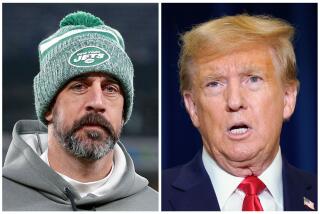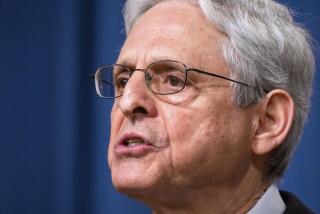Accusations Relegate Policy Issues to Limbo
- Share via
WASHINGTON — The controversy engulfing the White House is putting major policy initiatives in a state of suspended animation, including plans to craft a national tobacco settlement, bail out East Asian economies and expand Medicare.
Policymakers around the capital say it is suddenly perilous to predict what will become of an assortment of foreign policy and domestic issues that require the strong, influential hand of presidential leadership.
White House officials and congressional leaders insist they will soldier on. But politicians warn that it will be hard to resolve the thorniest issues as long as the president is hobbled or distracted by the incendiary charges that he had a sexual relationship with a former White House intern and then lied about it.
“I’m concerned about how the government functions if this thing isn’t resolved really quickly,” said Rep. Henry A. Waxman (D-Los Angeles).
“Until there is some kind of resolution, Washington is going to be in a policy vacuum,” said a senior House Democratic aide.
In the meantime, the capital’s policy wonks are having a difficult enough time getting anyone--press, pols, the public--to even pay attention to issues that arguably have more tangible effect than the president’s sex life.
“Clearly there’s nothing else getting out right now,” said John Czwartacki, press secretary to Rep. Bill Paxon (R-N.Y.), who held a press conference on taxes last week in the shadow of the controversy. “There’s only one story in Washington.”
*
For no one is the problem of trying to talk policy over the roar of scandal more acute than President Clinton. He will attempt to get his message out to Congress and the country on Tuesday, when he delivers his annual State of the Union address.
Democrats fear that this, the president’s golden opportunity to shape the terms of the year’s legislative debate, will be squandered in the current political environment. One House aide cringed to imagine the scene after the speech, when members of Congress leave the House chamber to face banks of television cameras and crowds of reporters who will doubtless be more interested in their views of the accusations than of the speech.
The obsession with the accusations may wane in the short term. The longer-term question is whether it will weaken Clinton or otherwise undermine his ability to press key elements of his legislative agenda, such as his proposal to expand access to Medicare to some people younger than 65.
One senior White House aide said he is unconcerned.
*
“The Republican Congress never was going to pass the stuff because they like Bill Clinton. They’re going to pass the items on his agenda because it would be politically painful for them not to,” the aide said. “Those fundamentals don’t change.”
Others are not so sanguine. A well-placed member of the senior citizens’ lobby fears the investigation will take the steam out of the proposed Medicare expansion. Likewise, it could diminish momentum for a long-term plan to reform Social Security that could be a key part of Clinton’s State of the Union address.
“That agenda now is at risk,” the lobbyist said. “This is going to turn a lot on whether he can refocus public attention on his agenda on Tuesday.”
On tobacco, prospects that Congress could enact a global settlement were already precarious. Republicans are divided among themselves, and there are deep partisan divisions about many key aspects of the legislation.
Many participants were counting on Clinton to force both sides to the table to agree on a compromise to reduce youth smoking and reimburse the government for treating people with tobacco-related diseases. If Clinton is hobbled, it is far less likely that a consensus will develop.
“To the extent that anybody was counting on the president for leadership, this is one more roadblock in the way of giant comprehensive tobacco legislation,” said John Banzhaf III, a professor at George Washington University and organizer of an anti-smoking group called Action on Smoking and Health. “Until the president gives some kind of clarity and some kind of focus, you can’t expect people to go through such a complex piece of legislation.”
A Republican leadership aide agreed. “The past 48 hours will have an unbelievable effect on everything. Everything has slowed down, and tobacco, which was always a real long shot, is even longer.”
The accusations also cast a long shadow over crucial foreign and trade policy initiatives. Clinton was already facing a tough fight to win approval of funding for the International Monetary Fund to help bail out ailing East Asian economies.
*
“We will be looking to the administration for some leadership on this issue because right now there is not broad support for it on either side of the aisle,” said Elizabeth Morra, spokeswoman for the House Appropriations Committee, which will handle IMF funding legislation. “We are hoping this does not interfere with his ability to play a leadership role.”
Republicans predict the controversy will make it even more difficult for Clinton to revive his bid for “fast-track” trade negotiating authority, a campaign that faltered late last year when Clinton failed to muster enough support to pass it in the House.
“This kills fast-track,” said a House GOP leadership aide. “Those kinds of votes require you to trust your president. Now there is no reason to trust Clinton.”
While uncertainty about Clinton’s future casts a pall over the policymaking process in Washington, everyone seems to be having the same response: struggling mightily to seem engaged in policy.
On Friday, Clinton exhorted members of his Cabinet to keep their nose to the grindstone. The White House held a detailed briefing on its plans to end fraud and waste in Medicare, the subject of Clinton’s weekend radio address.
Republican leaders, who have remained studiously silent on the allegations against Clinton, plan to spend Monday in a full-day meeting about their legislative agenda.
Democrats are also trying to keep their heads down. Top Senate Democratic staffers received e-mail from the office of Senate Minority Leader Tom Daschle (D-S.D.) urging them not to be diverted by the probe and to keep their focus on the Democratic legislative agenda.
*
Times staff writers Edwin Chen and Elizabeth Shogren contributed to this story.
More to Read
Sign up for Essential California
The most important California stories and recommendations in your inbox every morning.
You may occasionally receive promotional content from the Los Angeles Times.











